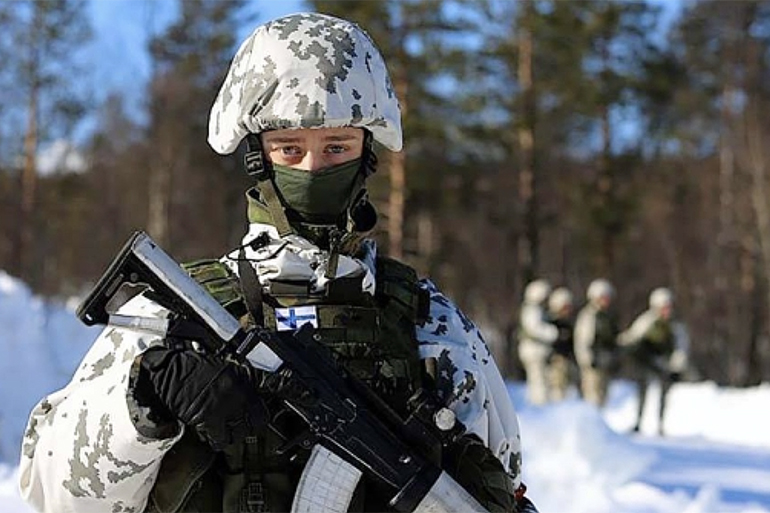
Recently, the U.S. media “broke” a story reporting that Finland planned to open 300 new shooting ranges in an attempt to encourage citizens to take a greater interest in national defense.
The reason? Increased threats from Russia. Threats they take seriously enough that their government is working to beef up shooting skills to the level where citizens were during their mandated national army service. In addition, service standards have been modified to accept diabetics and the government’s also encouraging more women to join.
Sweden’s Security Service says Russia poses a real threat to its territorial security with their decision to join NATO. For their part, the Russians aren’t happy that Sweden has dropped two centuries of military non-alignment following Russia’s invasion of Ukraine.
This may sound like paranoia to us, but Finland has — quietly — been preparing for some time. Late last year, a friend sent me a brochure called “Home Preparedness Advice” that had been distributed there. Its purpose was to provide “basic survival guidelines in the event of crisis or war.” He also told me it was a “direct lift” from a similar guide that’s been distributed in Sweden.
It/they read(s) like a standard disaster pepper’s handbook, complete with a checklist of the things necessary disaster survival- natural or manmade. The lists are broken out by food, water, shelter (warmth), communications and “other.”
The foodstuffs aren’t things you’d find advertised in a restaurant. Cheese spread and “other spreads in tubes” might not sound appetizing in normal circumstances, but the guide isn’t geared for tourists. The advice offered is intended to help urban or rural residents get through tough times until services — or civil order — can be restored.
As Americans, we routinely ignore threats that European nations take seriously. That’s not entirely due to our military prowess (although it’s still pretty awesome). We are nowhere as close to external hostile threats as our European friends.
Substitute “Russia” for “Kentucky” – only sixty or so miles from our Tennessee home and you have a more “Scandinavian” perspective on the proximity of a real non-natural disaster threat.
We’re not prepping for armed conflict in our neighborhood, but we are making preparations for our spring/summer storm season. Killer tornadoes in three consecutive springs have motivated us to take preparations for severe weather a bit more seriously.
And our prep list doesn’t really look that different from the Finnish survival list. Food, water, shelter and communications are essentials – whatever the emergency.
So, too, are some of the other things we normally take for granted. Lighting, for example, doesn’t seem to be much of a concern until the lights go out. At that point, it’s a bit late to start wondering about batteries for flashlights or a means to charge the myriad of devices we use for everything from communications to navigation.
The “wait-and-see” position was abandoned long ago in our home. If anything, we have more secondary power devices than most. A combination compressor/battery jumper box capable of multiple charges of phones, iPads and the wi-fi card that would make them from pleasant distractions into viable communication tools sits on permanent charge in the garage. In the small addition to our house (which could serve as temporary quarters should the power stay out for long) we have a secondary power supply that can be charged via solar if necessary.
And there’s our ultimate bug-out bag. It’s parked in secure storage less than a half-mile from our house. The RV that is stored is kept fueled, batteries charged (via solar trickle charging on the roof) and propane tanks filled. That not only makes it ready-to-go should we want to take a last-second camping trip, it gives us a a fully-capable charging station and short-term home should disaster strike. Time spent “boondocking” has shown it’s a far better way to shelter than any tent, much less a powerless home.
Experience has taught us that in an emergency there are few more calming things than a hot shower and comfortable place to sleep. A kitchen, refrigerator, hot water and a functioning bathroom are all luxuries that we take for granted.
In an emergency, the RV also has the outboard capabilities to keep the refrigerator/freezer going in the house. It won’t run the HVAC or other major systems, but keeping food from spoiling extends the length of time between your family situation going from inconvenient to unsustainable.
Now- when you’re not under the pressure of an emergency- is the time to ask the basic questions about food, water, shelter, medications, and all the things we take for granted. Looking for batteries for your flashlight during a power failure definitely is not.
If you’re new to the idea of being prepared, you’re not alone. And you’re not without resources, either. The American Red Cross has a general preparedness checklist that can get you headed in the right direction. From there, you can get additional information specific to your part of the country.
Preparedness is never a bad idea.
We’ll keep you posted.


At the rate Biden is dismantling our reliable energy sources, take it from me a thirty year former electrical utility engineer. Invest in a reputable whole house generator and pray that Biden does not screw up your natural gas supply or stock up on propane.
Catboss,
I am finalizing my home solar system design–including properly sized sine-wave inverter/s to operate critical systems in my home (deep-freezer, sump-pump, and well). I will also be able to generate several gallons of hot water on days with ample solar radiation. My intention is to be able to get-by even if the grid is down for years. (I won’t be living in luxury but I will have lights, water, and minimal heat as well as minimal hot water.)
I am also designing a modest battery storage system which will allow me to operate small fans at night when it gets hot outside. I won’t have air conditioning, but I will have fans which is far better than nothing.
The white europeans are just tyrannical lite. The Russians Chinese etc, are tyrannical heavy.
If the europeans can’t figure this out even after Adolf Hitler???
Then perhaps they deserve Russian domination.